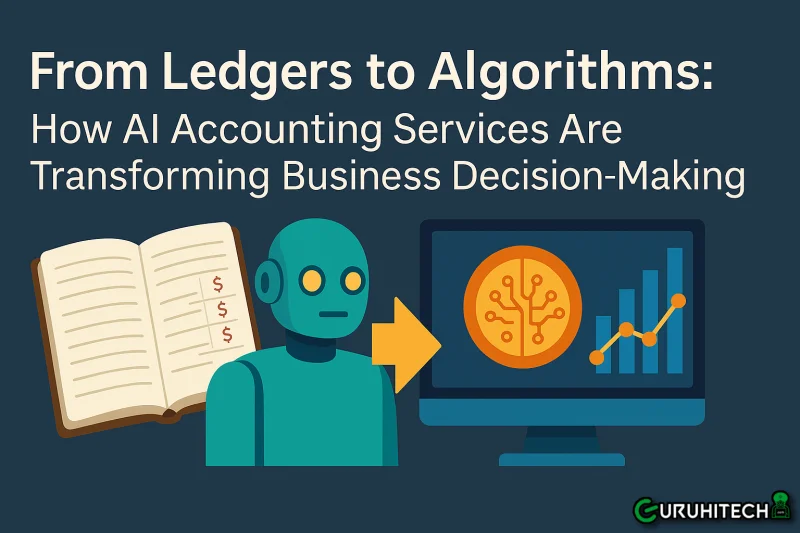From Ledgers to Algorithms: How AI Accounting Services Are Transforming Business Decision-Making

Accounting has long been the backbone of business operations, serving as the language through which financial health is communicated. Historically, this discipline relied on meticulous manual entries in physical ledgers, demanding precision and time-consuming labor. With the advent of digital spreadsheets and enterprise resource planning systems, the process became more efficient but still required significant human oversight. Today, artificial intelligence is ushering in a new era—one where algorithms not only record transactions but also interpret data, identify patterns, and support decision-making in real time.
AI accounting services represent a seismic shift in how businesses manage their finances. These systems leverage machine learning, natural language processing, and big data analytics to automate routine tasks such as invoice processing, expense categorization, and reconciliation. More importantly, they provide insights that were previously inaccessible or too complex to derive manually. This transformation is not just about speed—it’s about elevating the role of accounting from record-keeping to strategic foresight.
Automating the Mundane to Unlock Strategic Potential
One of the most immediate benefits of AI in accounting is the automation of repetitive tasks. Traditional bookkeeping involves entering data, matching transactions, and generating reports—activities that are prone to human error and consume valuable time. AI systems can perform these functions with remarkable accuracy and consistency. For example, tools like Finalyzer and Leazeon can scan thousands of invoices, extract relevant data, and categorize expenses within seconds. This not only reduces operational costs but also frees up accountants to focus on higher-value activities.
Automation also enhances compliance and audit readiness. AI can monitor transactions continuously, flag anomalies, and ensure adherence to regulatory standards. This proactive approach minimizes the risk of fraud and errors, providing businesses with greater confidence in their financial integrity. Moreover, real-time auditing capabilities allow companies to identify issues before they escalate, fostering a culture of accountability and transparency.
Data-Driven Decision-Making with Predictive Insights
Beyond automation, AI accounting services like Hogan CPA Financial services offer powerful analytical capabilities. By processing vast amounts of financial data, these systems can identify trends, forecast cash flow, and simulate various business scenarios. This predictive power enables leaders to make informed decisions about budgeting, investment, and resource allocation. For instance, AI can analyze seasonal sales patterns and recommend optimal inventory levels, or evaluate customer payment behavior to improve credit policies.
Such insights are particularly valuable in volatile markets. Businesses can respond swiftly to changing conditions, adjusting strategies based on real-time data rather than historical reports. This agility is a competitive advantage, allowing firms to seize opportunities and mitigate risks with greater precision. In essence, AI transforms accounting from a reactive function into a proactive driver of growth.
Enhancing Collaboration and Accessibility
AI accounting platforms also improve collaboration across departments. Financial data is no longer siloed within the accounting team; it becomes a shared resource accessible to marketing, operations, and executive leadership. Dashboards and visualization tools present complex information in intuitive formats, enabling non-financial stakeholders to engage with data meaningfully. This democratization of financial intelligence fosters cross-functional alignment and supports cohesive strategic planning.
Additionally, cloud-based AI solutions offer accessibility and scalability. Businesses of all sizes can leverage sophisticated accounting tools without investing in expensive infrastructure. Remote teams can collaborate seamlessly, and updates are deployed automatically, ensuring that systems remain current and secure. This flexibility is particularly beneficial for startups and SMEs, which can now access capabilities once reserved for large enterprises.
Ethical Considerations and Human Oversight
While AI offers immense potential, it also raises important ethical and professional considerations. Algorithms must be designed to avoid bias, protect data privacy, and maintain transparency. Accountants must understand how these systems operate, interpret their outputs, and ensure that decisions align with ethical standards and business objectives. The role of the accountant is evolving—not disappearing. Professionals are becoming advisors and analysts, guiding organizations through the complexities of digital finance.
Training and education are essential to this transition. Accountants must develop skills in data science, technology management, and strategic thinking. Institutions and firms are responding by updating curricula and offering certifications in AI and analytics. This investment in human capital ensures that the profession remains relevant and resilient in the face of technological change.
The Future of Accounting: Intelligent, Integrated, and Insightful
Looking ahead, AI will continue to redefine the boundaries of accounting. Emerging technologies such as blockchain, quantum computing, and advanced neural networks promise even greater capabilities. Integration with other business systems—HR, supply chain, customer relationship management—will create unified platforms that offer holistic insights. Decision-making will become more collaborative, data-driven, and responsive to real-world dynamics.
In this future, accounting is not just a support function—it is a strategic asset. Businesses that embrace AI accounting services will be better equipped to navigate complexity, drive innovation, and achieve sustainable success. The journey from ledgers to algorithms is more than a technological evolution; it is a reimagining of what it means to manage and understand financial health.
Ti potrebbe interessare:
Segui guruhitech su:
- Google News: bit.ly/gurugooglenews
- Telegram: t.me/guruhitech
- X (Twitter): x.com/guruhitech1
- Bluesky: bsky.app/profile/guruhitech.bsky.social
- GETTR: gettr.com/user/guruhitech
- Rumble: rumble.com/user/guruhitech
- VKontakte: vk.com/guruhitech
- MeWe: mewe.com/i/guruhitech
- Skype: live:.cid.d4cf3836b772da8a
- WhatsApp: bit.ly/whatsappguruhitech
Esprimi il tuo parere!
Ti è stato utile questo articolo? Lascia un commento nell’apposita sezione che trovi più in basso e se ti va, iscriviti alla newsletter.
Per qualsiasi domanda, informazione o assistenza nel mondo della tecnologia, puoi inviare una email all’indirizzo [email protected].
Scopri di più da GuruHiTech
Abbonati per ricevere gli ultimi articoli inviati alla tua e-mail.
